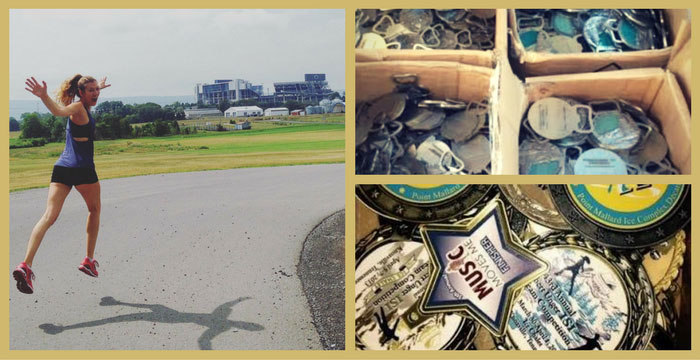
Your Runner Swag is Killing the Planet
Although you may still be on a Rock ‘N’ Roll Half Marathon high, we need to have an honest chat. Today, let’s reflect and think about our habits. Re: that swag.
Actually, all runners should rethink their “swag” demands.
My love affair with running
First things first: you likely won’t pick me out as a runner by looking at me. I’m 5’2 with short legs. I may even argue that I run twice the distance as you due to my short strides.
2007: My first Broad Street Run. I had never run more than a 5K (besides training) and gleefully ran down Broad Street. A few months later, I tacked on another 3.1 miles and completed my first half marathon.
The next year, I was determined to run a marathon before I turned 25. On November 23rd, 2008, I ran the Philadelphia Marathon. Weeks of turning down social plans, going on three-mile training runs and stopping in East Falls for a granola bar & water culminated in those 5 hours and 15 minutes on a freezing day. (And this is before I owned an iPhone, so Map My Run guided me each Sunday.) Crossing the finish line was an incredible feeling – sticking with me as I couldn’t walk without knee pain for the next two days.
I happily took that medal around my neck — which may have been my FIRST athletic award, ever.
Although I’ve slowed down off from “serious” training and long distance races, I’ve completed 8 Broad Street Runs in the past nine years and continued to run a 5K here and there.
So now that you got my runner’s pride, let’s fast forward a few years.
I’ve seen the race bags shrink from excessive paper, coupons and waste over the years, but I’ve noticed one disturbing trend: Medals. (I tried addressing this problem in 2012, but alas…)
Before you look at me with disgust, stay with me for a minute.
The problem with Race Medals & “Swag”:
I get that many people pick up running as a sport and are proud of their accomplishments. However, those medals add up to a lot of unnecessary, excess waste.
Although I couldn’t find a statistic for the number of race medals distributed every year, there were 2.5 million marathon and half marathon finishers in 2014. If we assume that 50% of those races distribute medals (in addition to the percentage out of the 8.3 million 5K finishers each year...) the number (conservatively) is a 1.8 MILLION to 5.4 million race medals every year in the USA.
Let’s consider the production: Most medals are made in China and shipped from overseas. (The major US-based producer is Ashworth Awards.)
Now, let’s review the life cycle of these medals. The race directors buy them (often from overseas) and ship them back to the US, carting it around by whatever (likely carbon transit). You receive it at the end of the race, wear it for 30-45 minutes and probably hang it on a wall or stash it in a closet for the rest of your life.
In addition to the medals, races often give away mugs, t-shirts, guides, etc., etc.
The excessiveness and expectation of race medals have gone too far. People complain if they don’t receive one – even holding grudges against race directors. (I thought the “Participation Trophy” problem was addressing children, not adults…)
How to Recycle Race Medals
Now that you’ve reconsidered your life choices, I bring you hope from the internet.
Sports Medal Recycling takes the extra, unwanted, canceled race, etc. medals from race directors that have dozens or even hundreds of unused/unwanted old race medals. They separate the medals and recycle it accordingly: the metal to scrap recycling, the cloth portions of a race ribbon go to textile recycling, and any plastic bags or bubble wrap (on the medals) go to plastic recycling. And, any shipping boxes go to cardboard recycling.
Although their business began primarily with Race Directors with too many leftovers, they Sports Medal Recycling began to hear from individuals who didn’t want race medals, academic medals from school or other sports. People can send their previous treasures to the program for recycling, too. You can see their collected goods on Facebook.
Plus, their website includes organizations where you can donate to those dealing with serious health issues in case you want your medal to have a second life.
According to the Sports Medal Recycling rep, the most frequent remarks?
“These have been sitting in a shoebox in my house for 10 years and I don’t want or need them.”
Where to recycle your old medals:
Sports Medal Recycling
679 Washington St
Unit #8-135
South Attleboro, MA 02703
*Don’t send glass, ceramic, or plastic medals, nor trophies.
You can always provide feedback to race directors about medals to try to reduce the waste in the first place.
Donate your Used Medals
We Finish Together donates used medals and adds a handwritten message for someone in need – whether an illness, hospitals, veteran hospitals, homeless shelters, cancer center’s, foster homes, Back on My Feet, Junior League, NF Tumor foundation and many more!
Readers, what are your thoughts on all of these medals? What would you do to reduce waste?









